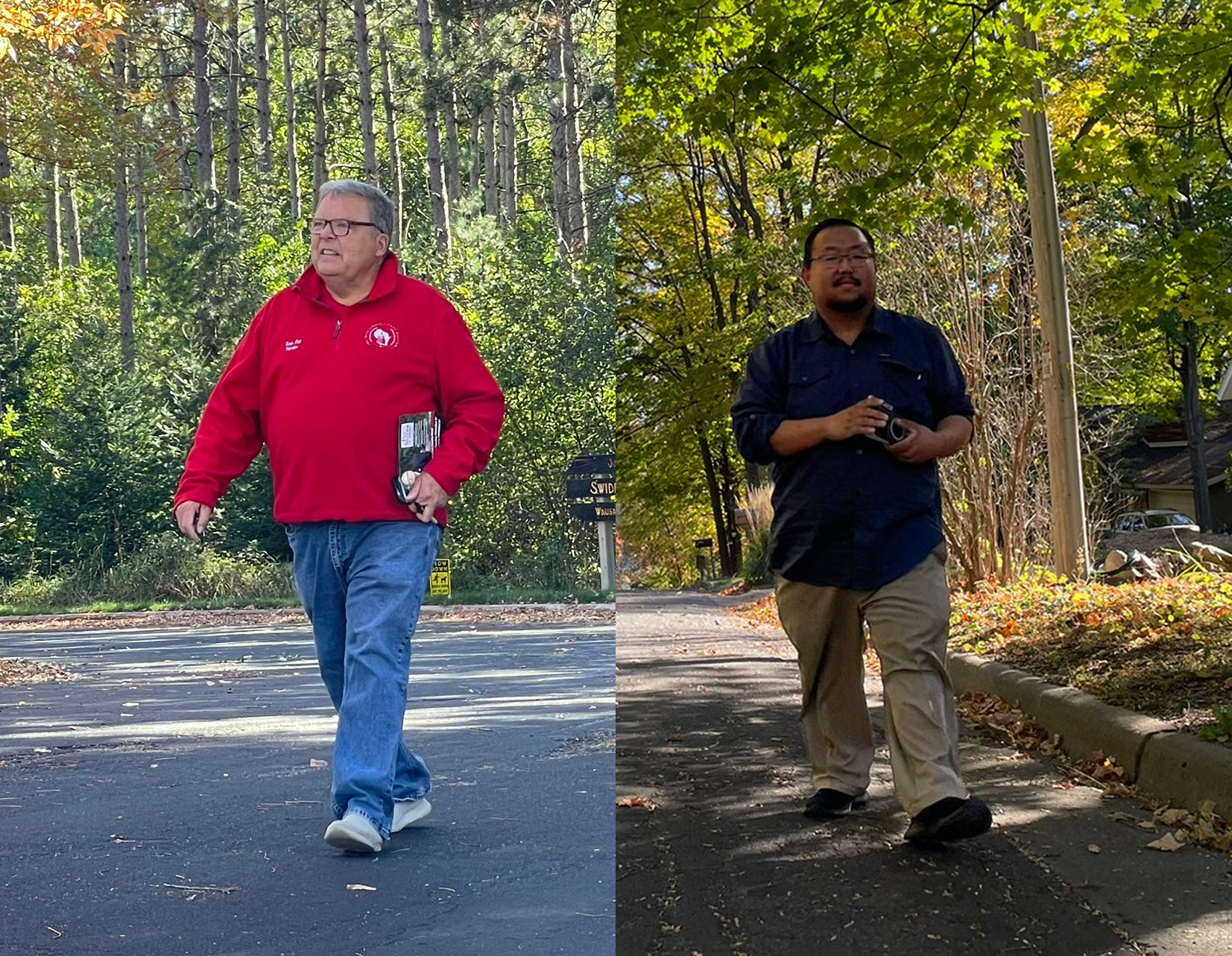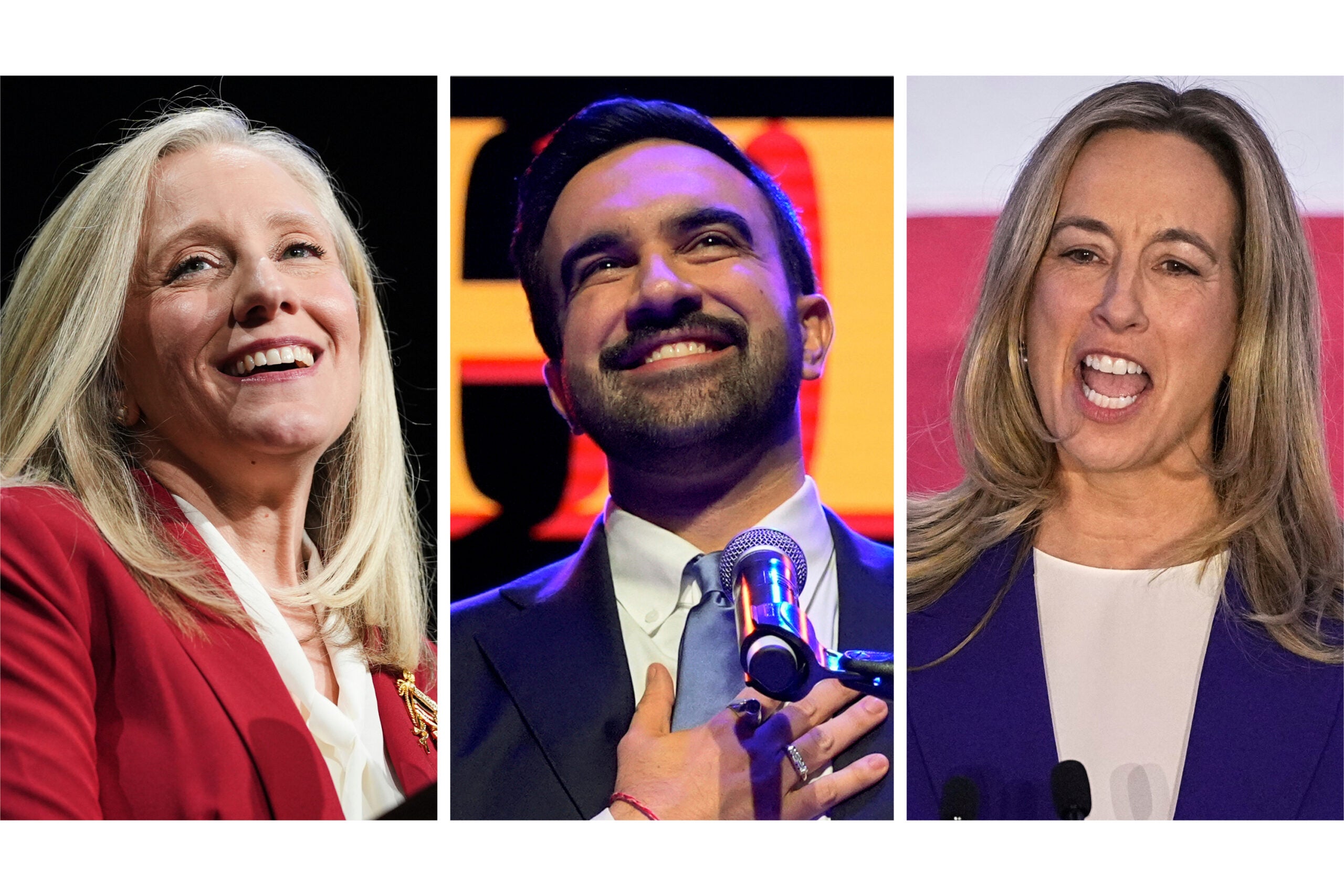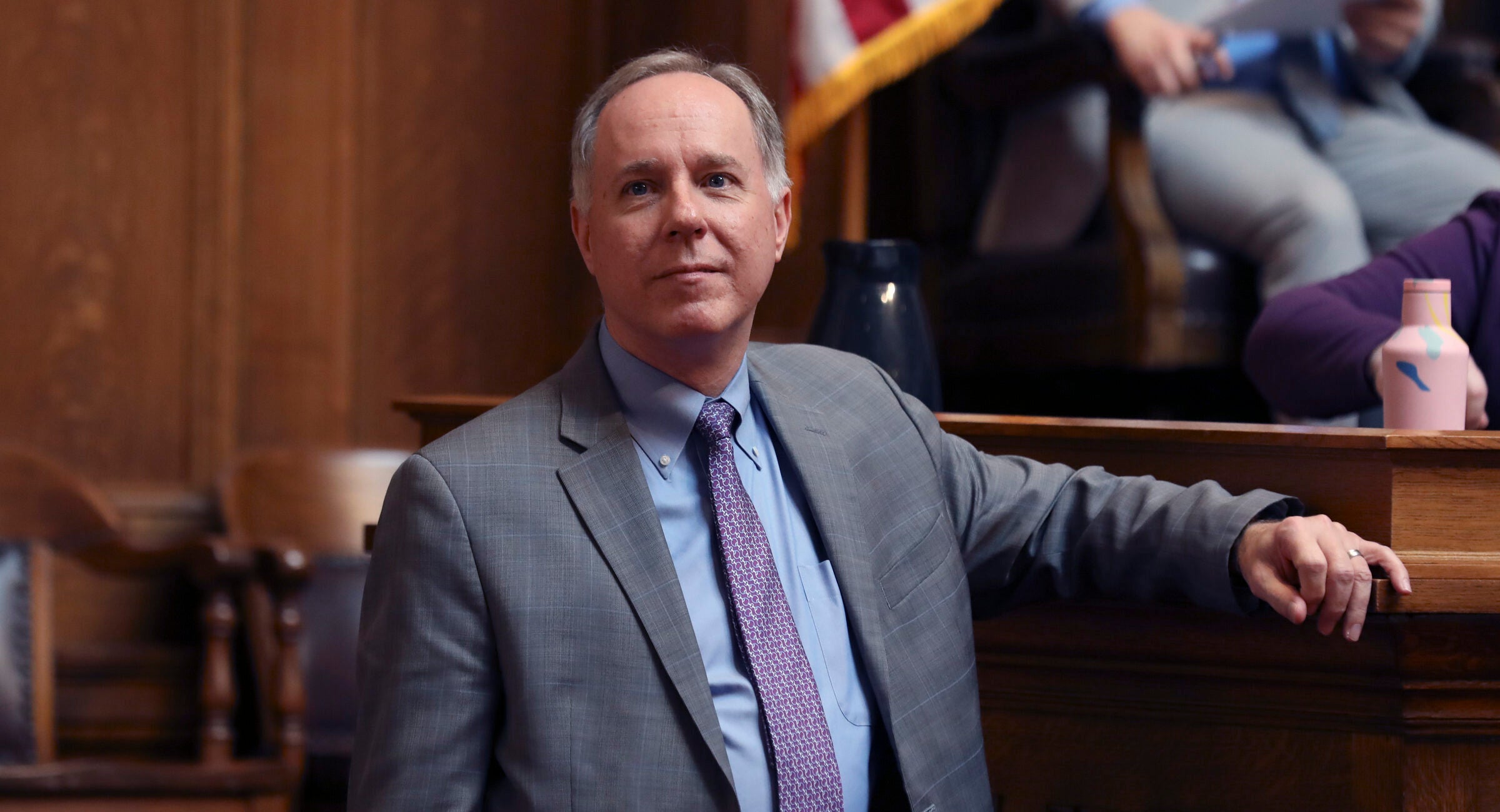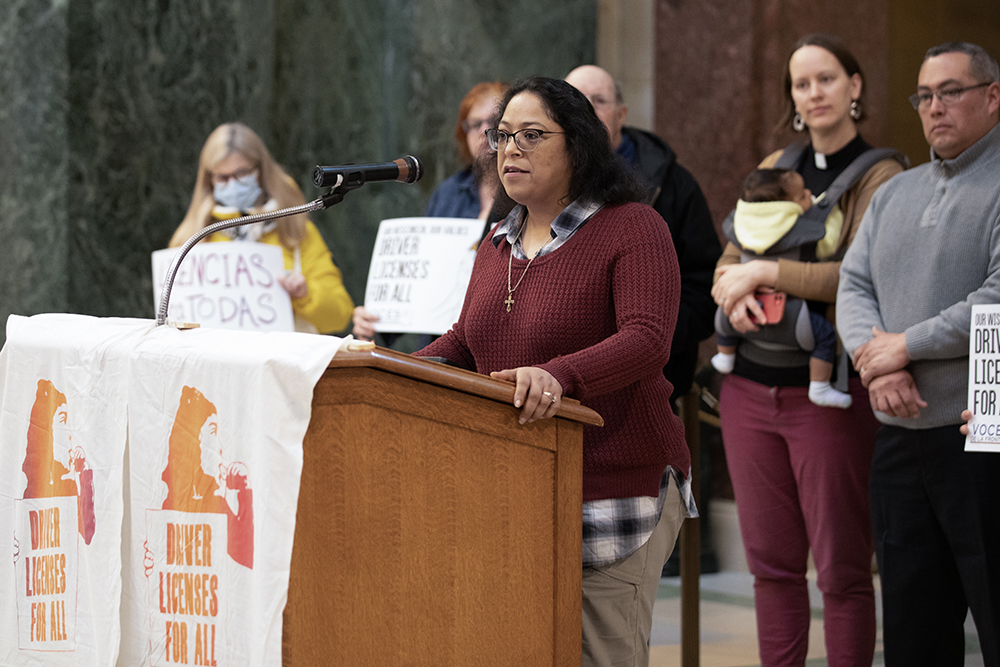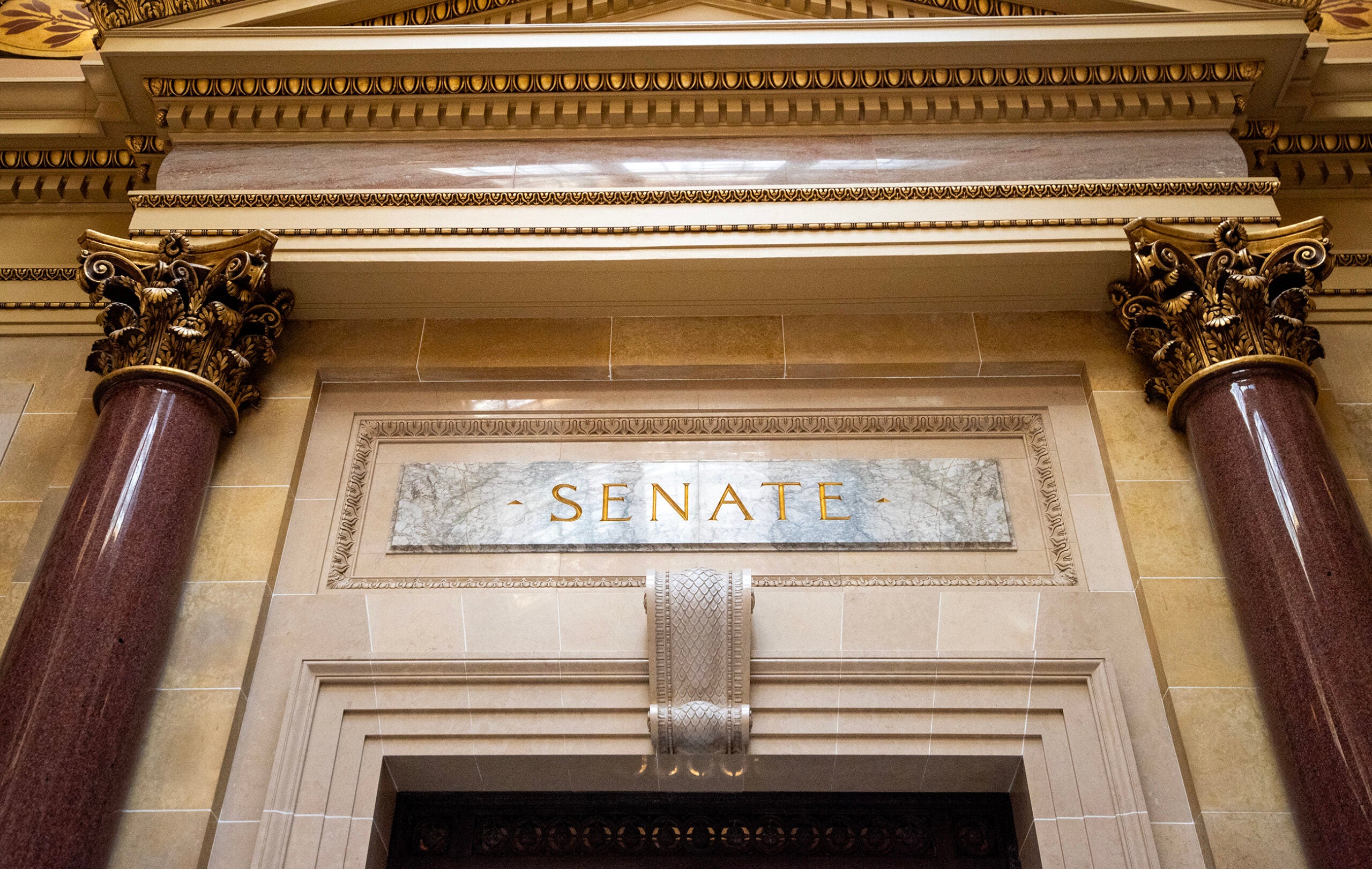In the days before the 2022 election, Wisconsin Republicans had a real shot at winning two-thirds supermajorities in both houses of the Legislature that would have given them the power to override vetoes by Democratic Gov. Tony Evers and control the agenda in state government.
Now, days before the 2024 election, both parties have a real shot at winning control of the state Assembly, with the outcome hinging on a handful of competitive districts that are scattered throughout the state.
This is what it’s like in Wisconsin under the new legislative maps, which were drawn by Democratic Gov. Tony Evers and passed by Republican legislators under pressure from the liberal majority on the Wisconsin Supreme Court. The Republican maps that preceded them cemented GOP majorities for 14 years. Under these new maps, state government is up for grabs.
News with a little more humanity
WPR’s “Wisconsin Today” newsletter keeps you connected to the state you love without feeling overwhelmed. No paywall. No agenda. No corporate filter.
John Johnson, a redistricting expert at Marquette University Law School, analyzed how the new maps would have performed in recent statewide elections. In 2022, Evers would have won a narrow majority of Assembly districts, and Republican U.S. Sen Ron Johnson would have won a slim majority, too.
“The Democrats have a model for how to win,” Johnson said. “And Republicans have a model for how to win.”
Here are a few of the districts that could tip the balance.
In Wausau, a tight race in a new district pits incumbent against local official
The first time Pat Snyder ran for the 85th Assembly District, in 2012, he lost by about 900 votes. Four years later he ran again, and won by about twice that margin.
The district as it was drawn under Wisconsin’s old maps had grown more Republican over time. But the new district, which includes Wausau, suburban Weston and parts of the surrounding area, is closely divided. It’s one of just four districts in the whole state that would have been won by both Evers and Johnson in 2022.
One person who no longer lives in the district: Rep. Pat Snyder himself. He’s rented an apartment in Wausau that he’s using as a campaign headquarters, and where he said he and his wife will live if he’s reelected.
“I guess that’s part of the politics, getting drawn out (of the district) by about a block and a half,” Snyder said. “They didn’t think I’d move. I’ve heard that from some pretty good sources inside the Democrat Party. They thought that I would stay put in Schofield and run in the 87th (Assembly District).”
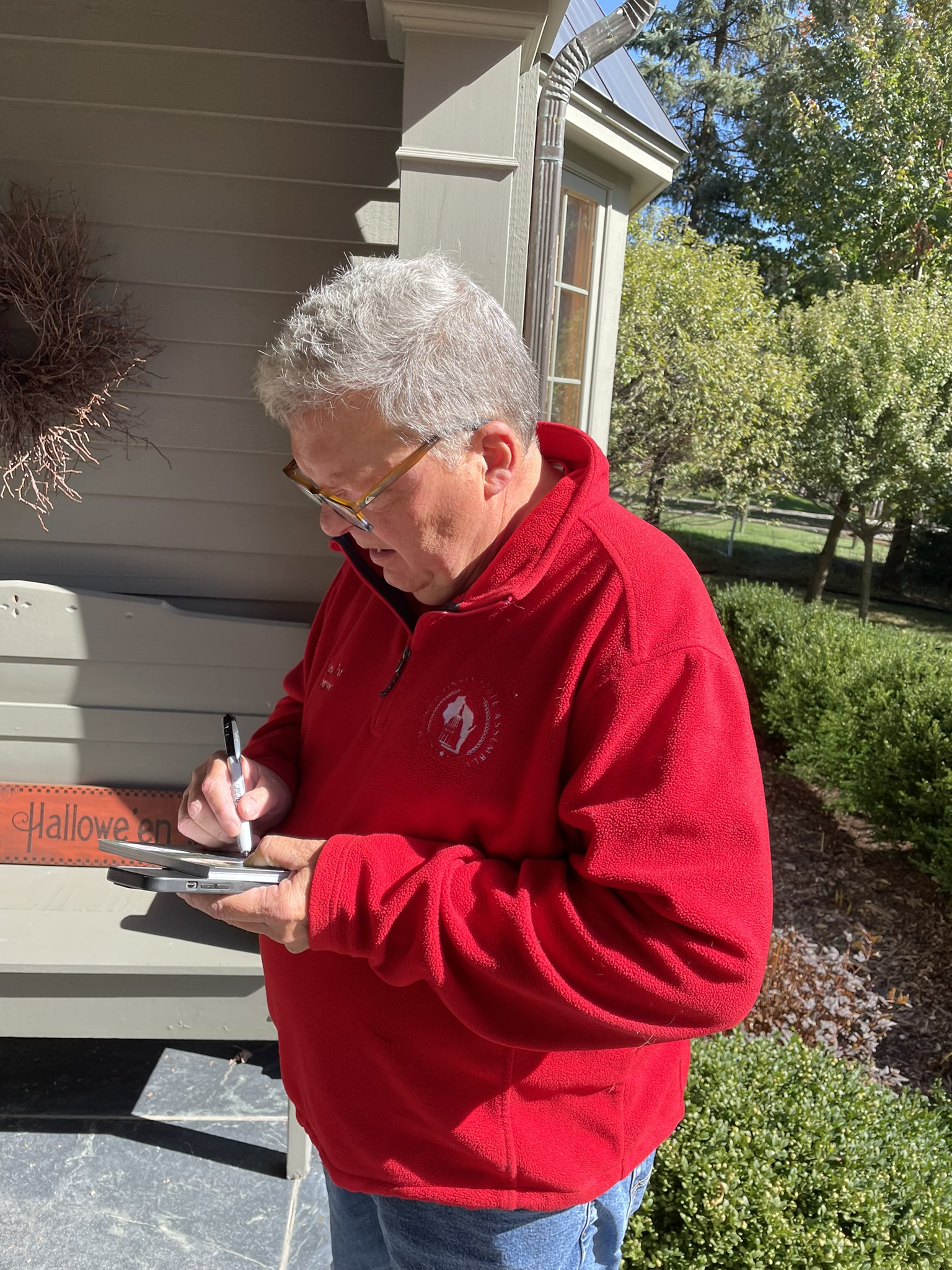
Instead, Snyder ran in the 85th, and the race is shaping up to be his most competitive in years. His opponent, Democrat Yee Leng Xiong, has raised nearly $150,000, according to the nonprofit watchdog Wisconsin Democracy Campaign, and is benefiting from an influx of cash from the state Democratic Party. Snyder has raised about $33,000.
Xiong, 30, is the executive director of the nonprofit Hmong American Center in Wausau. He was first elected to the D.C. Everest School Board when he was 19. He’s served on the Marathon County Board since 2016. He said the experience has given him a view of what matters to voters locally. He’s knocked on more than 15,000 doors in the district this campaign, he said, and he thinks voters are looking for a change.
“Gridlock is one of the big issues,” Xiong said. “They’re just tired of the partisan politics that’s existing in Madison at this moment.”
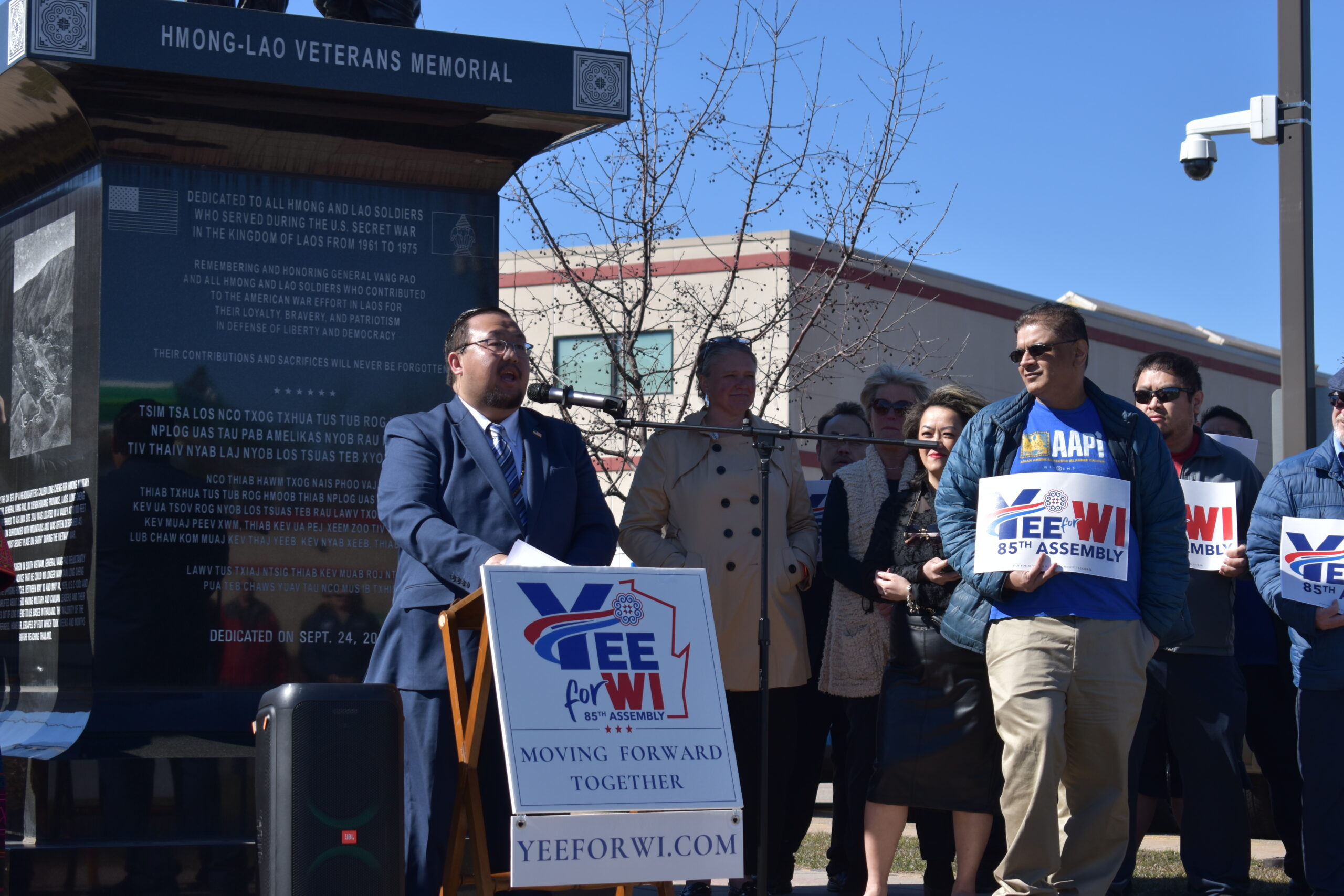
If elected, Xiong would be Wisconsin’s first Hmong state representative. His parents were refugees who fled from the Communist government in Laos after the Vietnam war. They lost a child, Xiong’s older brother, as they fled to Thailand.
“My parents taught me that whatever you’re doing, you’re doing for folks that never made it,” Xiong said. “You’re living the life that people like my brother never got the chance to experience.”
Before he ran for office, Snyder was a longtime conservative talk radio host in Wausau. He now says he sometimes played up conflicts for dramatic effect, but he’s tried to map a different course as a legislator. In the Assembly, Snyder chairs the Committee on Children and Families.
Last year, he broke with his party by favoring funding for a pandemic-era child care subsidy, and this year said he is open to expanding Medicaid under the Affordable Care Act, something the GOP has blocked in Wisconsin for the past decade.
“I have eight years on record of actually working across the aisle and getting some good things done,” Snyder said.
Xiong, who calls health care one of the most important issues of the race, has targeted Snyder’s opposition to abortion in his campaign. But like Snyder, Xiong characterizes himself as a moderate on many issues. Out knocking on doors, he said as much to Wausau resident David Kaatz.
“My joke with people is I’m too conservative for my friends on the left and I’m too liberal for my friends on the right,” he said. “I like to work with both sides.”
“You can’t get anything done if you don’t,” replied Kaatz, who said he’s supporting Xiong.
Snyder is putting in hours knocking doors, too. On a Monday in early October, he spoke with supporters who asked the same question: How’s it looking?
“The doors have been very similar to my last election, so on that count I’m kind of confident,” Snyder said. “But you know how anything can happen.”
Economy, abortion prominent in western Wisconsin Assembly race
About 150 miles due west, another GOP incumbent is fighting to retain control of a district that got more competitive this year.
Wisconsin’s 30th Assembly District covers parts of St. Croix and Pierce Counties along the Minnesota-Wisconsin border. It includes the cities of River Falls and Hudson. The district leans Republican under the new legislative map, but just barely.
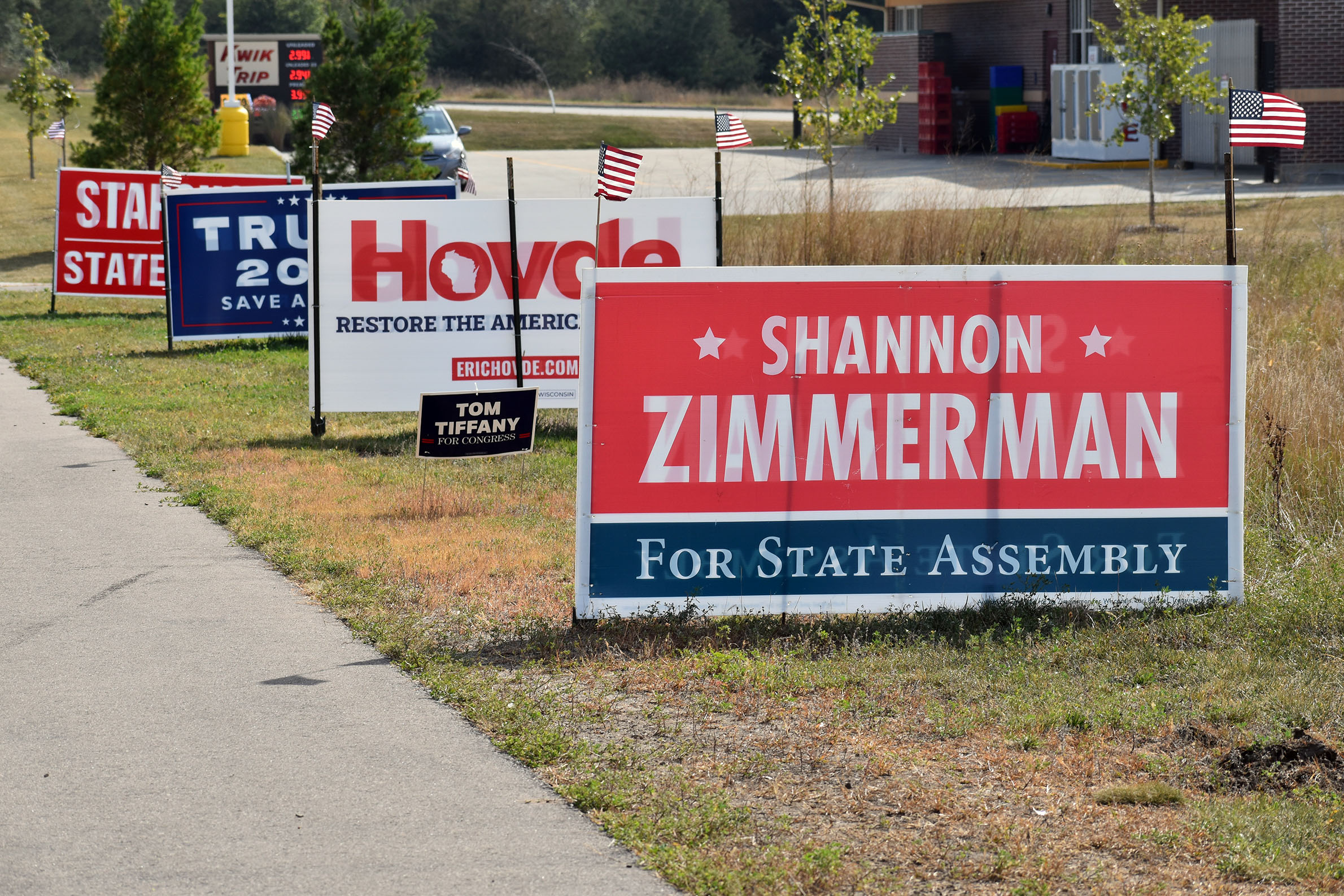
Incumbent Rep. Shannon Zimmerman, R-River Falls, is running for a fifth term. He’s a small business owner and member of the Legislature’s powerful budget-writing committee.
Zimmerman didn’t return WPR’s request for an interview. But he told the Western Wisconsin Journal that despite the hyper-partisan nature of the job, he’s willing to work with lawmakers from either party.
“One thing that I believe my colleagues on either side of the aisle would say is I bring a practical, common-sense approach to some of the challenges that we face,” Zimmerman said.
Zimmerman cites unfinished business as his reason for running. He points to GOP bills that Evers vetoed, which would have cut taxes for the middle class and retirees. On the Assembly floor this year, he said favorable tax rates would keep seniors in Wisconsin and draw in others from Minnesota.
“There’s a dramatic benefit here that we’re taking advantage of,” Zimmerman said. “I love it when I look across my district and seeing these people move in and staying in the area.”
Zimmerman’s Democratic challenger is Alison Page, the former Western Wisconsin Health CEO. She said Wisconsin can draw in people from other states and boost the economy by providing what families need.
“Young families need access to affordable housing. They need access to good childcare and daycare. They need and want access to really good public schools,” she said.
Page blames the state’s old gerrymandered maps for fostering the partisan divide. While speaking to volunteers, she said voters could elect a Democrat to represent the district for the first time in nearly 50 years.
“It’s winnable, and we think we’re doing a hell of a job on the ground game,” Page said.
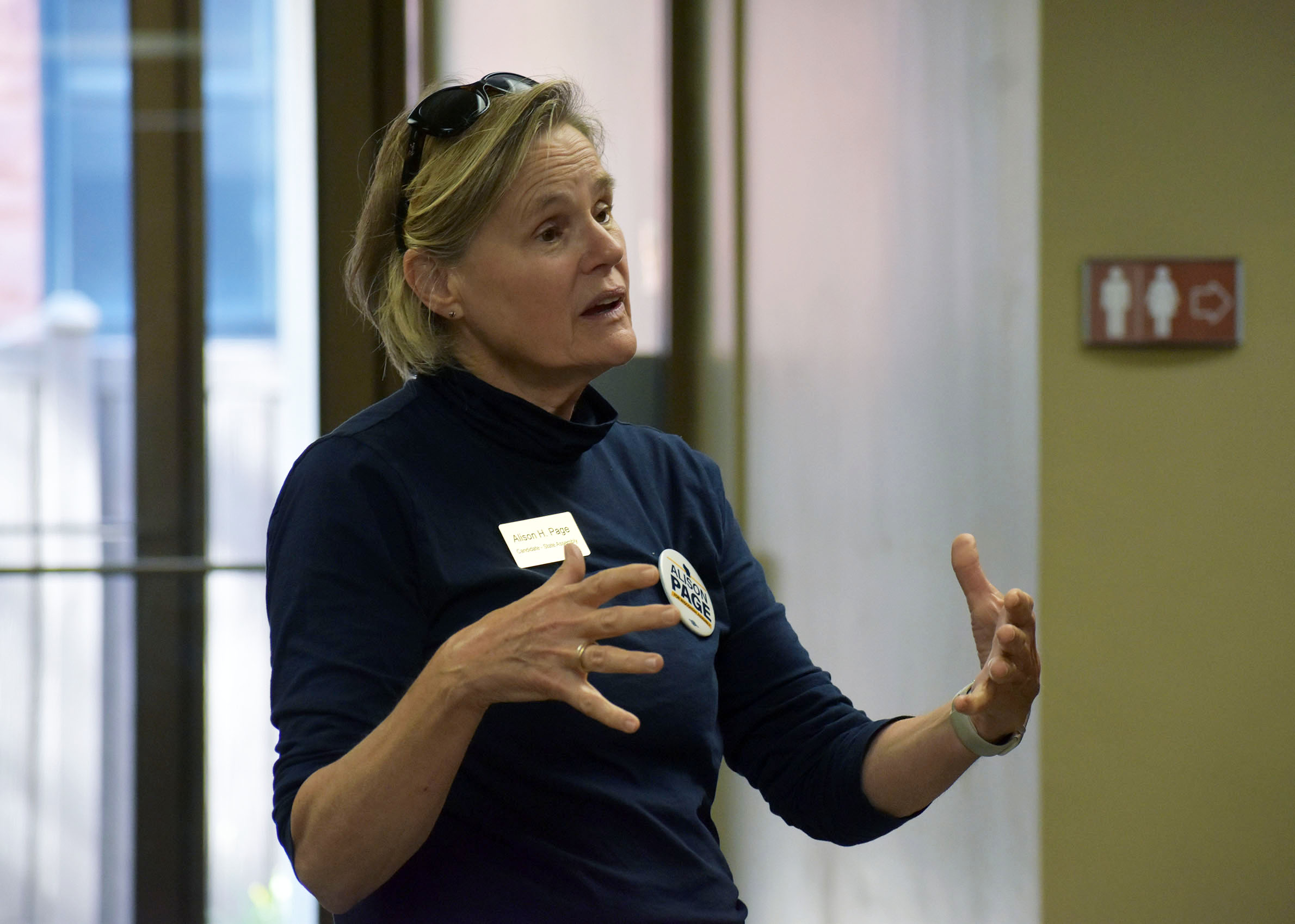
On a recent Saturday, Page spent the afternoon knocking on doors in Hudson, a suburb of the Twin Cities that used to lean Republican where residents have voted for Democrats in recent elections. Page ran into Hudson resident Stephanie Fox, who used to babysit for Page’s five children.
Fox said she’d like to see tax increases for people making $400,000 or more. She also wants more affordable health care for her three sons who live with chronic health issues along with abortion access in Wisconsin.
“It literally is health care, and the women I know don’t make that decision lightly,” Fox said.
It’s a decision that Page once made when she was pregnant with her fourth child and her health started to fail.
“I couldn’t even talk about it for years, but it was my decision,” Page said. “It was my decision, with my husband, my doctors and my God.”
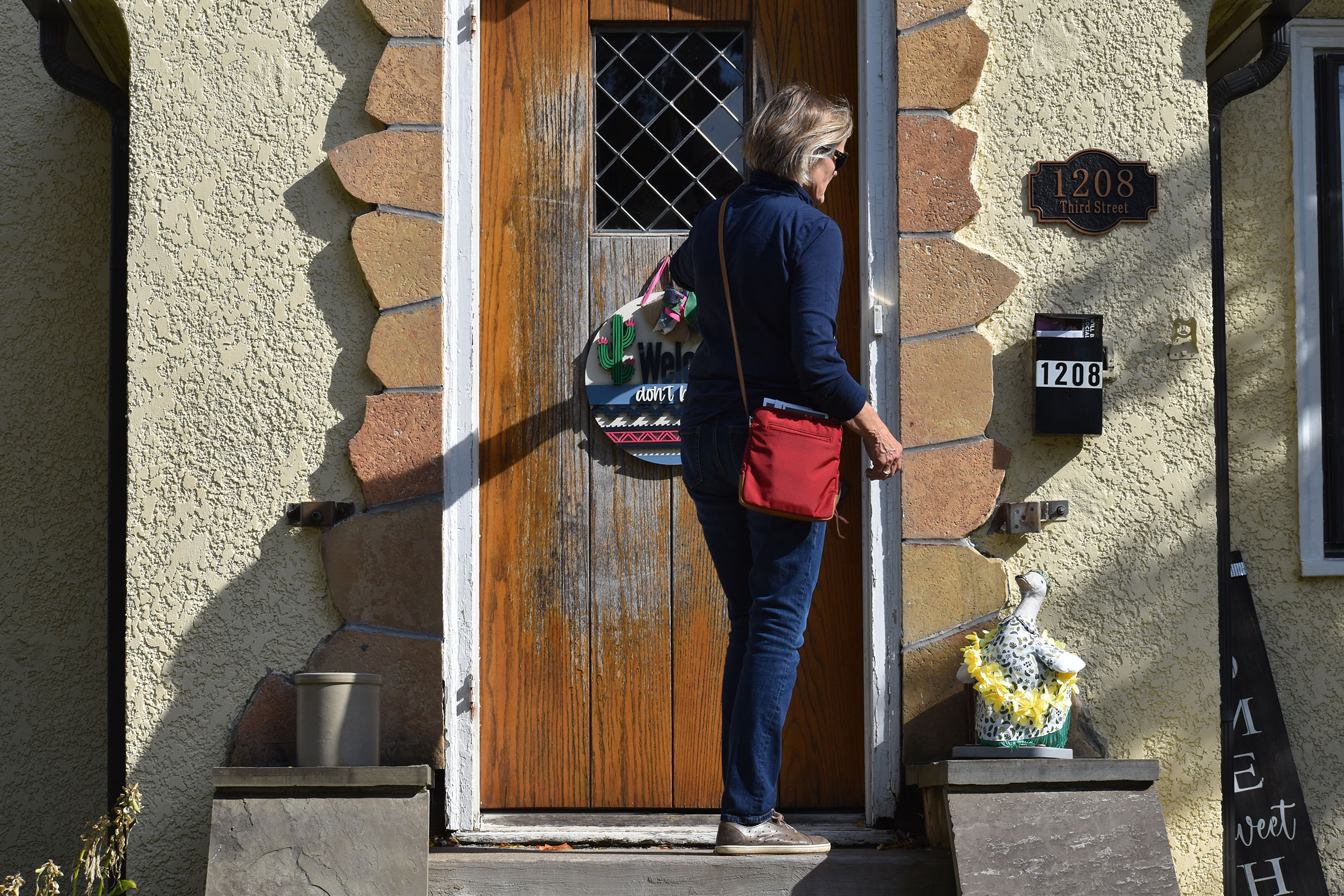
Zimmerman was among Republican lawmakers who introduced a bill that would have banned abortions after 14 weeks in Wisconsin with limited exceptions, including when the mother is at risk of dying or the pregnancies result from rape or incest. Democrats are hoping the issue will motivate voters and help flip districts like this one.
For the first time in years, Green Bay districts could go either way
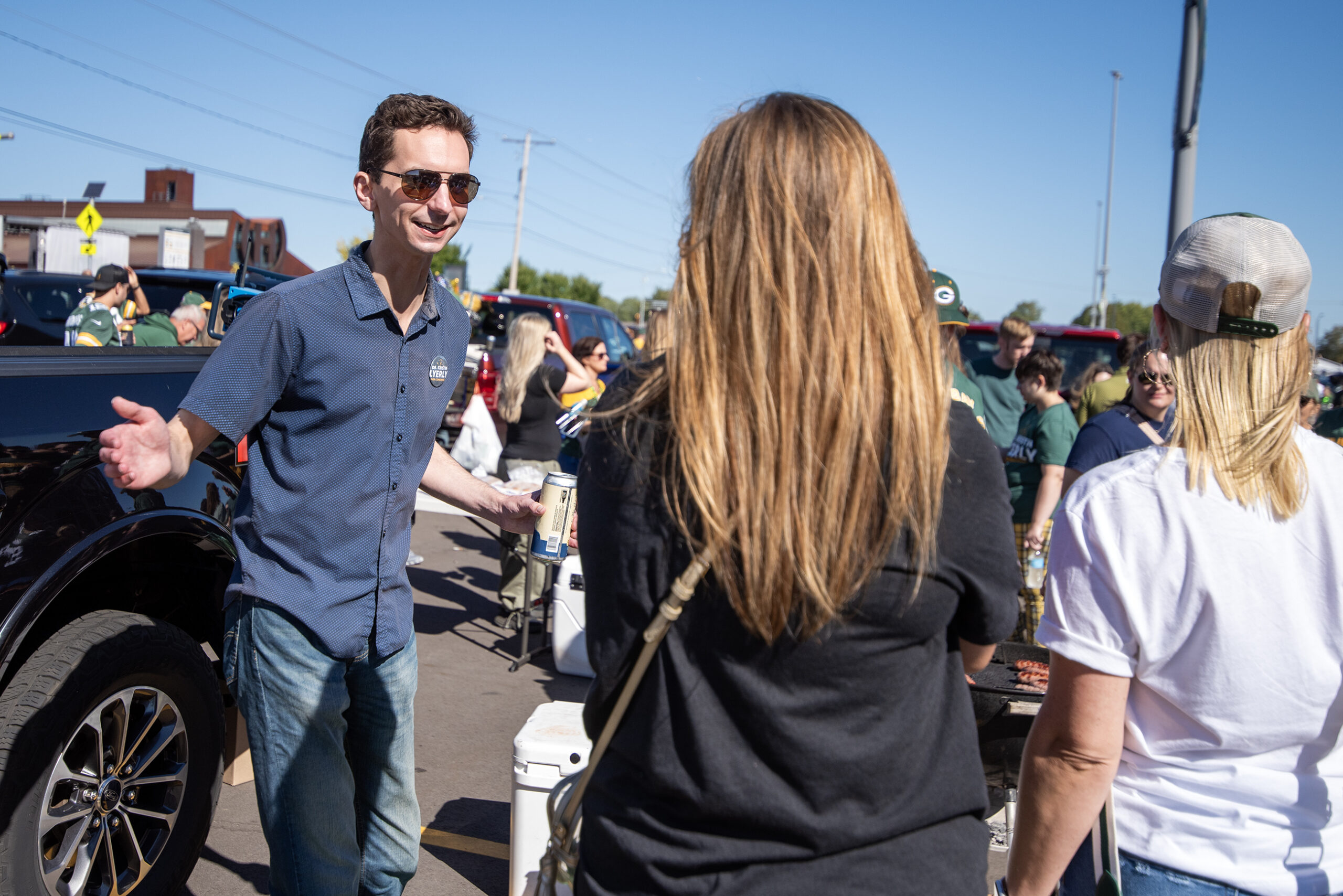
Smoke from portable grills filled the air with the smell of bratwurst on a recent Sunday in the parking lots that surround Lambeau Field. People were gathered to watch the Green Bay Packers take on the rival Minnesota Vikings, but in a state and city where football is a staple of the culture, they were also there for the pregame tailgate.
Most were content to ignore politics on this sunny morning, but not everyone has that luxury. For the first time in more than a decade-and-a-half, Lambeau Field and the surrounding community are part of one of the state’s most competitive Assembly races, and the candidates were out campaigning.
The new map created a cluster of districts in and around Green Bay that either party could plausibly win. In addition to the 89th, there’s the 88th, another Tony Evers-Ron Johnson district. They’re nested inside the 30th Senate District, which is currently held by Republicans but gives Democrats a slight edge under the new lines.
“You’d be hard pressed to find a more split area than there,” said Marquette’s Johnson.

There’s no incumbent in the new 89th Assembly District. The Democratic candidate is Ryan Spaude, a local prosecutor making his first run for office.
Spaude is well aware of the divided nature of this district. President Joe Biden would have won this district in 2020 — former President Donald Trump would have carried it in 2016. He jokes that the district is as purple as some of the Minnesota Vikings jerseys in the crowd that day.
“Ninety-nine seats in the state Assembly,” Spaude said. “There’s about a dozen that are like mine that could go either way. These seats will determine who gets the majority.”
Spaude said the No. 1 issue he hears from voters is about the cost of living.
“The second issue is—why can’t you people work together? Just the gridlock you see,” Spaude said.
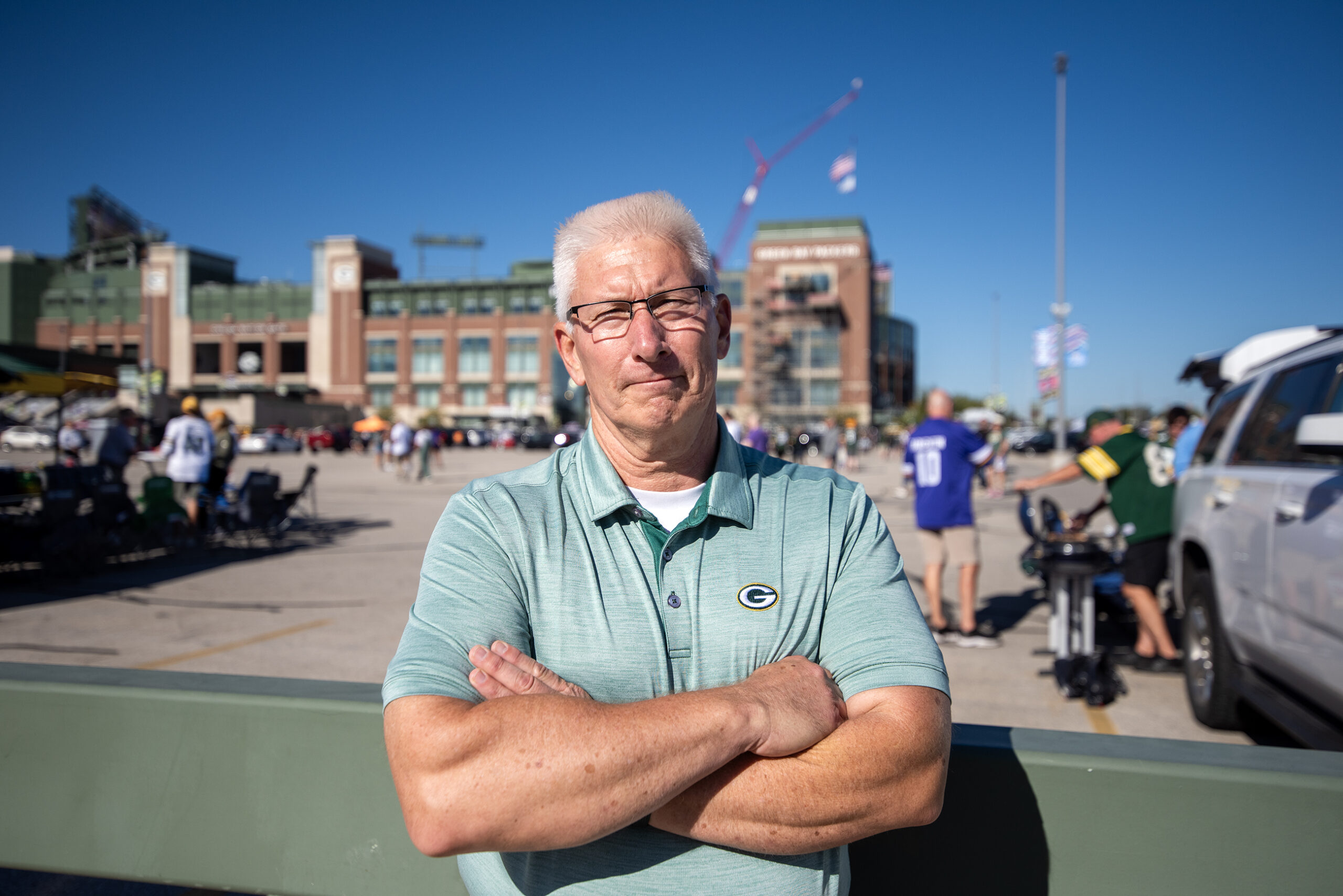
Nearby, Patrick Buckley, the Republican candidate for the 89th, also made the rounds. When asked the top three things he talks about with voters as he knocks on doors, Buckley gave a simple answer.
“Economy, economy, economy,” Buckley said. “A lot of people are hurting out there, and we gotta figure out what we can do as government to give them some sort of relief.”
Buckley is a small business owner and former police officer who currently chairs the Brown County Board. He said the new map created an opening for him because this new district had no incumbent. But he insisted he hasn’t really thought about how his race could tip the balance in the Legislature.
“We get a lot of stuff done at the county,” Buckley said. “I’d like to take what I’ve learned there at the county to the state level. Because I think we need that there.”
The calls from Buckley and Spaude to work together are a common refrain from candidates in these newly competitive legislative races. In tone, at least, the new maps have already set up a different kind of campaign for the Legislature.
11 Assembly districts to watch
Precisely which districts are competitive can be tough to nail down given the lack of public polling on individual races for the Legislature, not to mention other variables like who’s running and how hard they’ve campaigned.
But some things are quantifiable, including the number of seats Democrats would have to flip to win a majority in the state Assembly. In the most recent session of the Legislature, they held just 35 seats, meaning they’d need to hold all their current districts and win another 15 to gain a 50-seat majority in the Wisconsin Assembly.
According to a composite score of 2022 election results developed by Johnson at Marquette, the two parties are separated by single digits in 11 districts, including the 85th, 30th and 89th Assembly Districts. That’s also the case in eight other races. They are:
- The 61st Assembly District, where Republican Rep. Bob Donovan of Greenfield is running against Democratic challenger LuAnn Bird of Hales Corners. Donovan represented the 84th Assembly District under the old map. The new 61st is one of the closest districts in the state, although Democrats carried it in both the race for governor and U.S. Senate in 2022.
- The 26th Assembly District in Sheboygan, where Democrat Joe Sheehan is challenging Rep. Amy Binsfeld, who represented the 27th Assembly District under the old map. Democrats carried this district in the 2022 Senate and governor’s race.
- The 88th Assembly District in Green Bay where Democrat Christy Welch is taking on Republican Benjamin Franklin. This is an open seat, split by Evers and Johnson in 2022.
- The 53rd Assembly District in Neenah, where Democrat Duane Shukoski faces Republican Dean Kaufert. While this is an open district, Kaufert represented Neenah in the Legislature years ago and was previously the city’s mayor. The district leans Democratic.
- The 94th Assembly District, which features a rematch between Democratic Rep. Steve Doyle and Republican Ryan Huebsch, both of Onalaska. Doyle has successfully defended a competitive district for years. Huebsch is the son of former state Rep. Mike Huebsch, who once held this seat. Evers and Johnson split this district in 2022, Biden won it in 2020 and Trump won it in 2016.
- The 21st Assembly District, currently represented by Republican Rep. Jessie Rodriguez of Oak Creek. She faces a challenge by Democrat David Marstellar of Milwaukee. The 21st leans Democratic.
- The 92nd Assembly District, where Democrat Joe Plouff faces Republican Rep. Clint Moses, both from Menomonie. Moses represented the 29th Assembly District under the old map. This is an Evers-Johnson district, though it generally leans Republican.
- The 91st Assembly District, where incumbent Rep. Jodi Emerson of Eau Claire faces a challenge by Republican Michele Magadance Skinner of Altoona. The 91st leans Democratic.
Editor’s note: Rob Mentzer reported from Wausau, Danielle Kaeding reported from Hudson and Shawn Johnson reported from Green Bay.
Wisconsin Public Radio, © Copyright 2025, Board of Regents of the University of Wisconsin System and Wisconsin Educational Communications Board.

